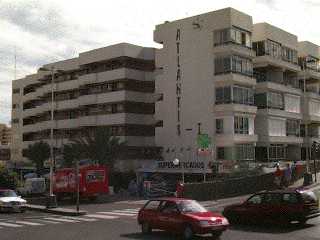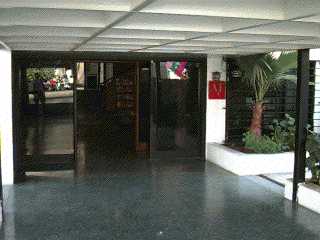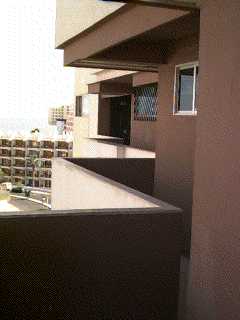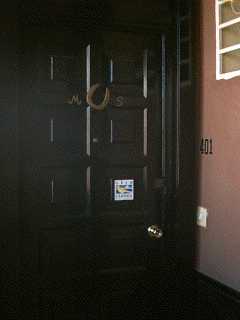|
|
 subscribe
subscribe
|
 subscribe subscribe
|

1995 Eivissa (Ibiza): Fish Monger Gran Canaria |
. . . . . . . . . . . . . . . . . . . . . . . . . . . . . . . . . . . . . . . . . . |
1995 Gran Canaria: Welcome to Gran Canaria 18 Oct 1995 Welcome back to Gran Canaria. On the horizon we see the Canary Islands as the jet descends in fits and starts. As Gran Canaria fills the port-side windows I think to the past. It's been... what... ten years since I've been here? I was here alone for Christmas 1982, and with Patty two years after that. Twelve years? I don't feel old enough to say that I did something by myself twelve years ago. The jet comes in for a smooth landing; I can feel the heat reflecting off the tarmac through the plane's windows. The sun is hot. We taxi to an area near the terminal and are quickly met by mobile stairways. I grab my carry-on luggage and descend toward the bus that'll take us the remaining few hundred meters. As I step through the jet's front doorway onto the stairs the hot, dry air hits me. After an hour of over-conditioned cold air, the sweltering heat is quite a shock. I'm perspiring in a few seconds. As I wait for my checked luggage to arrive I look around me. My fellow passengers seem to be a few tourists (German, I guess) and many locals, returning from the Spanish mainland. Even though there are signs that forbid smoking posted on every vertical surface, everyone has already lit up. Clouds of cigarette smoke waft around the baggage. To compensate, the baggage carts are free for the taking. Luckily the bags arrive before I succumb to the poisonous atmosphere; I head for the exit, back into the hot air. My grandmother had given me directions for finding the bus station; evidently the taxi lobby is as strong here as in San Francisco. Even with her directions it proves to be a massive undertaking: the bus station is up a huge clover-leaf ramp, and the only way to get there is to take the same ramp the cars take. Once I'm oriented, having confirmed my directions with two different people, I head down the side of the terminal toward the ramp, almost a half-kilometer (three-tenths of a mile) away. "Psssssst! Psssssst!" I look left and right. It's a taxi driver, leaning against his cab. "You want a cab," he asks. "No thank you," I reply. "I'm taking the bus to Playa del Inglés." He gives me a long look. "I can take you for 5000 pesetas (US$40)," he offers. "No, really, thank you very much. I'm just going to hop on the bus," I say, nodding at him. He looks left and right. "For you, today, I do it for 3500 pesetas (US$28)." We're on two different wavelengths here; I don't want to bargin for a cab, I want to get to the bus. I start walking again. "Hey!", he says to me, "how much you want to pay?" I stop and think about it. "I want to take the bus," I answer, "but I've got 1500 pesetas (US$12) that I'd toss for a cab ride." He looks insulted, and slowly answers, in a way calculated to let me know I've offended him and an entire chain of taxi-driving ancestors, "2000 pesetas (US$16)." It's been a few years since I've had to haggle. One of the pleasures lost on Westerners in the "civilized" world is the lack of haggling. Here, and during my trip into the Mid East, I got a lot of practice haggling. The secret is being ready to do without the good or service you're haggling over. I'm already mentally prepared to take the bus. I tilt my head downwards, looking at him over my eyeglasses. Pregnant pause. I have his attention. "1500 pesetas." Another pregnant pause. As I turn back to the cart, to continue on my way to the bus, I hear a heavy sigh behind me. "Bueno, 1500 pesetas." I thank him and push the cart to the back of the cab. To show me he's deeply hurt by my barganing, he only puts one of the two bags into the trunk before he walks to the front of the car and gets in. I smile, pop in the second bag, and get into the back seat. He pulls out of the airport to the autobahn. Many, many years ago the taxi companies purchased Mercedes-Benz taxicabs. Tourists said that was an insane expenditure, but over the years the diesel behemoths have proved their worth by staying running without needing costly parts from Europe. The cab I'm in has leather seats, a wood dashboard, and a good stereo. Unfortunately he's using the expensive four-speaker stereo to listen to talk-radio. It seems to be in the local dialect, because I can barely understand what's being discussed. Thirty kilometers (eighteen miles) later we're in Playa del Inglés (the Beach of the English). He knows my destination, but to show me he's still hurt by the bargaining, he drops me kitty corner. I cheerfully pay him, thank him, and step out to my first view of the condominium building that my grandmother has owned for at least twenty years now: Atlantis I. (There's never been an Atlantis II.) 





|
| Have you found errors nontrivial or marginal, factual, analytical and illogical, arithmetical, temporal, or even typographical? Please let me know; drop me email. Thanks! |